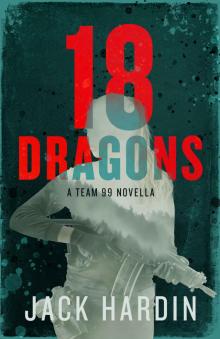- Home
- Jack Hardin
18 Dragons Page 2
18 Dragons Read online
Page 2
“Nope.”
Cicero sighed. “I haven’t been out in two weeks. You believe that? There’s only so much range practice you can get in and Xbox to play before you start to get bored.”
Faraday spoke around a mouthful of food and jabbed her fork toward him. “That’s because they’re about to let you go,” she said. “I heard Mortimer talking the other day about bringing our personal standards up.”
Cicero rolled his eyes and turned back toward the television.
“She might have a point,” Ellie said. “You’re probably doing penance for leaving your sat phone on that back street in Cairo.”
“I didn’t hear it fall!” he said. “Good grief.”
Ellie winked at Faraday. “I’ll see you guys later.” She held up the folder. “I need to wrap my head around this.”
“And a shower!” Cicero called after her. “I don’t know where you went, but you smell like a rotten forest.”
“Jungle,” she called out as she left the room. Her personal quarters were at the far end of the hall, her window overlooking the woods just behind the airport. This compound had been her home for the past four years. These people, her extended family. She loved living with them, fighting with them. She would die for them. And every time she went out, she wondered if she would die with them.
Ellie walked in and shut the door behind her. She walked into the bathroom and turned on the shower, then went back to her small desk that sat against the wall opposite her bed. She pulled the chair out, sat down, and opened the folder. It was labeled 18 Dragons.
She started reading.
Chapter Three
Xu Chuanfu motioned for his driver to turn the air conditioning up before looking out his window onto the Huangpu River as they crossed over the bridge and into the Pudong District of Shanghai. He leaned his head back onto the rear seat’s leather headrest and closed his eyes. He was tired. He felt a heaviness in his chest that he hadn’t felt since this time last year. For the fifth year in a row, the second week in August did not allow him much sleep. Countless people had told him that each year it would get easier, but as yet he had not found that to be the case. The grief, the longing continued to stir up a dull pain deep within him.
Tomorrow was the anniversary of his wife’s death. Song had given him thirty-five years of marriage before she had been taken quickly and mercilessly by lung cancer. To Xu, it did not feel like five years. As she lay dying, she had told him to remarry, that she didn’t want him to be lonely. But Xu had no interest in remarrying. There were nights when the loneliness hovered over him and felt like a cold, sodden blanket laying across him, nearly smothering him. But the thousands of memories she left him with were always enough to make it until morning. Song would be the only wife he would have. He had no desire to replace or supplement her friendship.
The blacked out Range Rover in front of them turned left onto Dongchang Road, and his driver followed closely. Another Range Rover tailed behind them. Until seven months before, Xu had had no need for a personal security detail. But the attempt on his life had changed that. He had been giving a speech at the University of Peking, his Alma Mater, speaking to a crowd of students gathered in Centennial Hall. The theme of the speech centered on the dance of capitalism and communism in a global economy. But while he made his concluding remarks, a student in the balcony produced a handgun and began shooting toward the stage. A 9mm round had grazed Xu’s temple, leaving a scar that would never fully go away. Another round hit a faculty member in the face, killing her instantly; another caught the University's vice president in the knee.
Brave students near the shooter had overcome him, stripped him of his weapon, and subdued him until security could break through the crowd and carry him off. A subsequent investigation had revealed that the shooter had not acted alone. He and three other students had conspired to assassinate Xu. His old views on Communist Party doctrine and his aged adherence to Marxist ideology were repressive and would only inhibit the philosophical and political freedom they had discovered during their excursions in the West.
Two of the students had been sent to prison, the other two executed.
Now, eight former members of the People’s Liberation Army special forces were tasked with keeping Xu safe, his own private detail.
His cream-colored Mercedes-Maybach, a model which took its luxurious cues from the Bentley Mulsanne and Rolls-Royce Phantom, pulled up to the curb in front of the Jin Mao Tower, an eighty-eight-floor landmark skyscraper in the heart of the business district. Recognizing his car and accompanying entourage, the valets set traffic cones behind and in front of the vehicles. Xu opened his eyes and looked at his watch. They were five minutes early.
He picked up the paper from the seat beside him. He flipped it open. The Shanghai Daily Times featured a lead article which covered the United States’ decision to impose a fresh round of import taxes on hundreds of Chinese goods. Xu’s upper lip curled unconsciously as he scanned the article. The tariffs, to be imposed immediately, were the opposing power’s response to China’s theft of American intellectual property. Cyber intrusions which, the U.S. claimed, had originated in China. China, Xu knew, would respond with tariffs of their own. It was a minor, temporary setback.
And it was worth however the Americans decided to retaliate.
As Xu finished scanning the article, he felt a certain amount of pride in his role. They were getting to the Western superpower, and that, he believed, was good. The democracy the United States espoused and the rise of the individual over the collective was repulsive.
As the founder and president of Tonayo Corporation, Xu enjoyed a personal net worth of over thirteen billion dollars. Over the last twenty years, Tonayo had grown into one of the largest mobile phone manufacturers in the world. He had been openly criticized for wrapping his bleeding-heart communism in a veneer of capitalism. Xu scoffed at such assertions. Even Marx himself had seen capitalism as a possible road to socialism before finally leading to the crowning glories of communism.
It was true. Xu had indeed done well riding China’s open markets to the heights of capitalistic success. Still, his belief in the old ideals and the Marxist tenets of his youth were unwavering. His loyalties lay first to the Party, to the State, and he opposed any who would try to undermine its agenda.
He was twenty-four when Chairman Mao died in 1976, and he could clearly remember the thick cloud of mourning that hung over the country that Mao had taken through the Cultural Revolution. He still had his original copy of the Little Red Book, the book that so stirred his mind and hardened the principles of the Communist Party deep within him. Even now, he could recite the Chairman with ease:
The Chinese Communist Party is the core of leadership of the whole Chinese people. Without this core, the cause of socialism cannot be victorious.
The enemy will not perish of himself. Neither will the Chinese reactionaries nor the aggressive forces of U.S. imperialism in China step down from the stage of history of their accord.
Every Communist must grasp, “Political power grows out of the barrel of a gun.”
If Mao were alive today, Xu thought, perhaps he may have amended the last quote to include “a keyboard” or “a network.” Great inroads were being made into the cyber networks and infrastructures of Western powers, thereby depositing more power into the hands of the Chinese Communist Party. Xu sat proudly at the top of that endeavor, quietly sponsoring and equipping organizations who worked tirelessly to crack into the networks of U.S.-owned multinational corporations and U.S. government agencies.
Following Mao Zedong’s death, Deng Xiaoping’s political recovery intended to lead China toward a grand expansion goal: developing the national economy, increasing production and productivity, and raising the living standards of the population. It worked, and now that China had become a superpower of its own, it was influencing global issues and had a voice in shaping international agendas and governance patterns.
Xu, like many in the Party, envi
sioned a world where communism was enthroned. But the greatest threat to this vision was the United States. The Western superpower would never wane on its commitment to the juvenile ideas of democracy—ideas which shunned a collectivist culture and saw the realization of individualism as its highest achievement.
But China would, in the end, have hegemony.
He looked at his watch again. His daughter, as busy as she was with her career on the seventy-fifth story of the Jin Mao Tower, was never late to an appointment with her father.
It had been five years since Song had died. Each year, on the anniversary of her death, he and his daughter set time aside for the two of them to honor her memory. The days leading up to this one were always difficult, so he busied himself more than usual this week, staying longer at the office and paying visits to his companies throughout the province.
The door nearest the curb opened, and a lady with long black hair slipped into the reclining seat across from her father. She wore a navy blue business suit and black heels. She leaned across the center seat and kissed him on the cheek. “Hello, Father.”
A series of thumps came from behind them as a valet loaded her luggage into the trunk. When he was finished, he stepped away from the vehicle, and the Range Rover in front of them pulled away, their driver following closely behind as they merged back into mid-morning traffic.
“Hello, Liu. Thank you for coming,” Xu said. “It means a great deal to me. I know how busy you are.”
“Of course. This is important. She was important.”
“Yes,” he said quietly. “She was.”
Xu looked out the window as he spoke. “I used to think that this would become easier. But each year I am only reminded of those things your mother continues to miss.” He looked back to his daughter, the blooming flower of his youth. “She would have been proud of you, Liu.”
She huffed lightly and put on a thin smile. “She would not have understood me.”
“No. You are right. She had too much of the old ways within her to understand your path. But she would have been pleased with the woman you have become.” He reached across and took her hand. He squeezed it. “You know I am.”
“Thank you, Father.”
He squeezed her hand again and let it go. “How was your morning?” he asked.
“Busy. Always busy.” Using two skilled thumbs, she tapped out a text message on her phone and sent it. She slipped the device into her purse and leaned her head back.
“I am hungry,” she said. “Have you eaten?”
“No. Tell me what you want, and I will make sure it’s on the airplane before we arrive at the airport.” She told him, and he pressed a button on the console that rang his private secretary. He translated the order of stir-fried razor shell with douchi.
They would be at the airport in thirty minutes. From there it would be a short flight on his private Falcon 50 jet to a remote airstrip in Tonglu, in Zhejiang province, two hundred and fifty kilometers to the southwest.
Chapter Four
Golden rays of early morning sunlight stretched down the wide dirt street, slowly forcing the evening chill from the air. Zhang Wei squinted into the brightness and smiled as he saw Mrs. Zhū shuffling down the street. He could set his watch to her. Each morning she appeared at exactly seven-thirty and purchased half a jackfruit and two figs. She returned each afternoon to select fresh vegetables for dinner. Her small head was wrapped in a colorful silk scarf, and a skirt drifted around her ankles.
Zhang’s fruit stall was one of several along the road, offering a wide variety of items including chestnuts, sweet potatoes, durian fruits, kiwis, rambutan, and bayberries. An opening led into a small concrete room with a high ceiling where an oscillating fan trembled as it circulated the humid air. He kept the most vibrant and healthy fruits displayed outside the shop, intended to lead shoppers inside where they would find more fruits and buckets of grain.
Mrs. Zhū drew up and squinted at Zhang through her thick glasses. “Good morning, Zhang.”
He smiled at his favorite customer. “Good morning, Mrs. Zhū. How did you sleep last night?”
She shook her head. “Less and less. Even the tea does not help anymore.” She started picking through the small pile of jackfruit and selected one, then moved to the figs and picked out two. She shuffled over to the stand’s owner and dropped the change into his palm. As she did every morning, she looked up at him and winked. “Make sure to save it.”
He replied with his usual chuckle. “Yes, Mrs. Zhū.” Several months ago, the old lady had gotten in her head that twenty-seven-year-old Zhang needed a wife. So, each morning she tipped him with the understanding that he would save up for a proper engagement ring.
“When I was a young lady, we did not have engagement rings,” she would remind him. “But these days, I think if you had a nice ring, you could catch a nice girl.”
At this rate, he estimated he would have enough for a ring within the next twenty-three years. Still, he appreciated her kindness.
“Goodbye, you handsome man.”
“I will see you this afternoon, Mrs. Zhū.” Zhang turned his attention to another customer, a large man, his eyes more deeply slanted than the locals, his high nose tilted as he eyed the array of fruit. He wore a fanny pack and had wide searching eyes, those of a tourist. A plastic visor was pulled low across his forehead. Zhang sized him up as hailing from the southern regions of China.
“Good morning,” he said. “What are you looking for today?”
The man leaned down toward the colorful rambutan, squinted at it, and sniffed. He stood erect. “One kilogram of rambutan, please.”
Zhang nodded and grabbed a small paper bag. He reached out and took a handful of the bright, hairy fruit. He dropped them into the metal scoop of his scale and then added another handful. He removed two fruits and the needle behind the glass read just under the customer’s requested weight.
“A couple of kiwis as well,” he heard the man say behind him. And then, “The hot springs...they are still hot in April?”
Momentarily, Zhang’s eyes widened, but he remained as he was and bagged up the items. “Yes. The springs are hot all year long. Especially those in the bamboo groves.”
“Bamboo groves,” the man repeated. “I have not seen any around here in some time. Not with all the recent construction.”
Zhang’s heart was now beating behind his sternum like a hammer. Outwardly, he remained calm. He turned, leaned over, and picked out a couple of kiwis. He handed them and the bag to the man. He told him the cost. The man nodded and unzipped his fanny pack. He produced a bill of folded paper currency. “I do not require any change,” he said.
“Thank you,” Zhang said. “I do hope you enjoy the springs.”
The man made his way down the street, disappearing down an alley. Zhang moved to the rear of the deep stall. He unfolded the money and found the additional piece of paper. He slid it into a pocket and walked back to the front and put the money into his small wooden cash box.
He walked out into the street and began moving small crates of fruits back inside.
Sung Ling, the older lady whose poultry stand was next to his, lifted her chin and called out to him. “Zhang, what are you doing? It is early yet. We just opened.”
He paused and held up his cell phone. “My mother called. My grandmother is sick. I must go see her.”
He walked over to Sung Ling and extended the key to the shop. “I will be gone four or five days.” She took the key and nodded. Neither had any help or assistance with their small businesses. So when the other fell sick or found themselves needing to leave unexpectedly, the other would cover their business as best they could. “I’ve set the fruit back inside, so you won’t have to do it later this morning. The nuts should be fine where they are until closing.”
“That is fine. I will manage, Zhang Wei.” She paused, took note of the tightness in his face. “You look worried. Is she very sick?”
“I do not know.”
It was a cool, quiet morning, but he discovered that his throat was now dry and his palms sweaty.
Chapter Five
Xu and Liu stepped out onto the tarmac beneath a steel gray sky. The air was cooler here than it had been in Shanghai. “It will storm tonight,” Xu said. “But it should be clear by the morning.”
A Mercedes-Benz G-Class SUV was waiting for them. Xu opened the door to the back seat for his daughter and shut it once she was in. He went around to the other side, and someone from his security detail opened his door.
Another Mercedes was in front of them, carrying the rest of the security detail. Both vehicles put the airstrip behind them and took Changsheng Road out of the city. At the edge of the city, the vehicles slowed and turned onto a narrow, bumpy dirt road. They entered a thick forest, crossing over creeks and rivers, and winding through the mountains for half an hour until they finally arrived at the base of a steep hill. A gate blocked the entrance to a private road that led up the hill, lush with a thick, green carpet of grass that had been recently mowed. One of the guards stepped out of the front SUV and unlocked the gate. He pulled it open and waved the two-car convoy on. After they cleared the entrance, the guard shut the gate and stood in front of it with his hands crossed in front of him, keeping watch.
Up the hill, the dirt road transitioned into tightly set stone and led around a cluster of bamboo to the front of a small cottage. In ancient Chinese fashion, the corners of the roof gently swept toward the sky, and two granite pillars stood at the threshold of the door. The interior of the cottage was just over one hundred square meters. It had a tiny kitchen, a bedroom for the cook, a corner room that functioned as a shrine to Song, and two more small bedrooms, one for Liu and one for her father.

 Savage Recruit (Ryan Savage Thriller Series Book 8)
Savage Recruit (Ryan Savage Thriller Series Book 8) Bitter Tide
Bitter Tide Vacant Shore
Vacant Shore Breakwater
Breakwater The Apostate
The Apostate 18 Dragons
18 Dragons Lonely Coast
Lonely Coast Savage Truth
Savage Truth Broken Stern_An Ellie O'Conner Novel
Broken Stern_An Ellie O'Conner Novel Broken Stern: An Ellie O'Conner Novel (Pine Island Coast Florida Suspense Series) Book 1
Broken Stern: An Ellie O'Conner Novel (Pine Island Coast Florida Suspense Series) Book 1